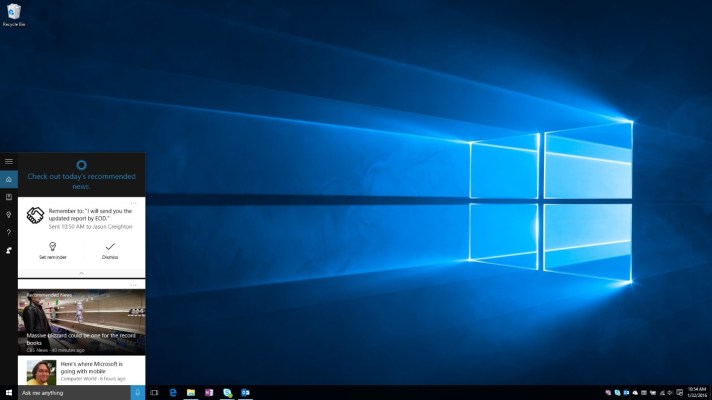Microsoft’s personal assistant tech Clippy Cortana is getting a few more feathers in its cap, with the company rolling out the ability to push reminders to users based on their emails. Users of the Windows Insider early access program will get the feature first — followed in future, Microsoft said today, to all users of Windows 10.
So if you’re the kind of person who’s so busy with work you forget to buy the cinema tickets to go on that date with your S.O. then Cortana can now step in and help to save your marriage by digitally reminding you there’s more to life than answering work emails.
It can also do the same for specific work commitments, creating reminders based on the wording of your emails — so if you often message your boss to say you’ll deliver ‘such and such a report by so and so a day’, yet promptly forget to add this to your calendar, Microsoft’s digi-assistant can help by scanning your emails for key phrases and offering to create reminders for stuff you’ve promised to do.
Microsoft is calling this new feature ‘Commitments’, and says it was developed in conjunction with its Microsoft Research division. The emphasis here, as with all these digital assistant technologies, is pro-activity — although there’s always a sensitive balancing act to pull off when it comes to generating useful timely reminders but doing so in a way that’s light-touch and hassle free (and which avoids being creepy).
If you don’t like the idea of Cortana scanning your email — or of a robotic assistant popping up with ‘shall I create a reminder for this?’ suggestions — you can at least turn it off.
Scans are also apparently performed locally, according to Microsoft’s Marcus Ash talking to the Verge, with reminder details only sent to Microsoft’s servers after you agree to have a reminder created.
Another new feature coming in this Cortana update is increased sensitivity to a user’s calendaring routines — meaning the tech can analyze when a person prefers to have meetings and flag up any requests landing outside their usual time slots.
Cortana started life on Microsoft’s Windows Phone smartphones as a voice assistant aiming to rival Apple’s Siri, Google Now et al. But with Microsoft’s mobile project so stalled in marketshare terms Cortana was expanded to its full-fat desktop OS last year.
Redmond demoed the integration in January and rolled it out gradually to different regions over the course of 2015. Last year it also expanded to Google’s Android OS and Apple’s iOS — chasing the bulk of smartphone users.
It said today it intends to keep evolving the tech to “continue to refine Cortana’s intelligence and add new capabilities”. If it can’t own the mobile platform, Redmond at least wants a shot at earning indispensability as an app (and the still extensive reach of Windows gives it the chance to familiarize users of other mobile platforms with what Cortana can do).
Albeit, there’s plenty of other tech giants vying for the same trophy. One of whom — Facebook — is even throwing an AI/human hybrid at the problem. So Cortana can’t rest on its laurels.
